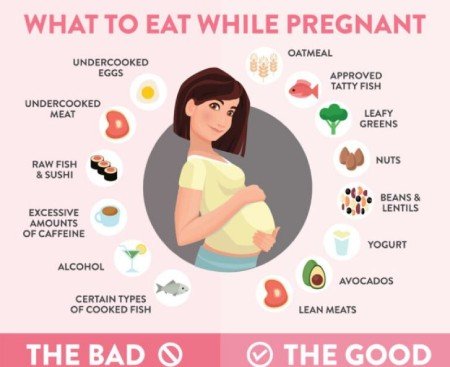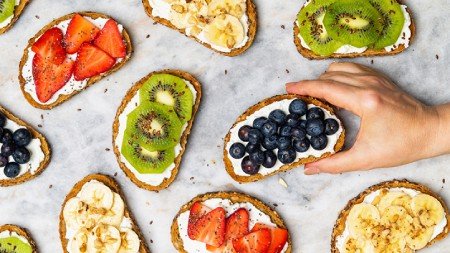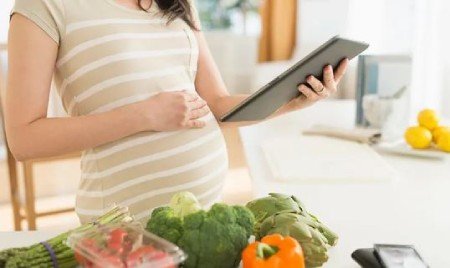
Essential Nutrients During Pregnancy
Healthy Nutrition During Pregnancy
Pregnancy is a sensitive period in every woman’s life that requires special attention to healthy nutrition. Proper nutrition during this time can have many positive effects on the health of both the mother and fetus. In this article, we will explore the principles of healthy nutrition during pregnancy and important tips to consider.
The Importance of Healthy Nutrition During Pregnancy
Healthy nutrition during pregnancy helps mothers maintain the energy needed for their daily activities and ensures healthy fetal growth. Proper nutrients can help prevent issues such as anemia, gestational diabetes, and fetal growth problems.
Essential Nutrients During Pregnancy
During pregnancy, mothers should ensure adequate intake of the following essential nutrients:
– Protein: Proteins are essential for the growth and development of the fetus’s tissues and organs. Excellent sources of protein include meat, fish, eggs, dairy, legumes, and nuts.
– Calcium: This mineral is essential for the formation of the fetus’s bones. Dairy products, leafy greens, and canned fish with bones are good sources of calcium.
– Iron: Iron is vital for delivering oxygen to the fetus and preventing anemia in the mother. Good sources of iron include red meat, legumes, green vegetables, and whole grains.
– Folic Acid: This B vitamin is essential for preventing neural tube defects in the fetus. Sources of folic acid include leafy greens, fruits, legumes, and fortified cereals.
– Healthy Fats: Unsaturated fats help the fetal brain and nervous system develop. Good sources of these fats include fatty fish, olive oil, and avocados.

Healthy Nutrition During Pregnancy
Tips for Healthy Nutrition During Pregnancy
– Variety in Diet: Including a variety of foods in your diet can help meet the body’s diverse needs. Colorful fruits and vegetables are important sources of antioxidants and vitamins.
– Sufficient Water: Staying hydrated during pregnancy is very important. It is recommended to drink at least 8 to 10 glasses of water daily.
– Taking Supplements: If needed, the doctor may recommend taking vitamin and mineral supplements such as folic acid and iron.
– Avoiding Harmful Substances: Consumption of alcohol, excessive caffeine, processed foods, and fast food should be limited. Raw and undercooked foods (like raw eggs and sushi) should be excluded from the diet.
Other Considerations
– Weight Control: Appropriate weight gain during pregnancy is important. The doctor can determine the amount of weight gain based on the mother’s initial weight.
– Dietary Changes Based on Needs: Nutritional needs may change during each trimester of pregnancy. Therefore, it’s best to consult a doctor or nutritionist.
– Listening to Body Signals: Some women may become sensitive to certain foods during pregnancy. Paying attention to these signals and adjusting the diet accordingly can be helpful.

Suitable Dietary Guidelines for Pregnancy
Planning for Nutrition During Pregnancy
To achieve healthy nutrition during pregnancy, proper dietary planning is essential. Here are some tips and ideas for creating a balanced meal plan:
1. Meal Timing
Main Meals: Include three main meals – breakfast, lunch, and dinner – emphasizing the use of diverse and nutritious foods.
Snacks: Consuming healthy snacks like fresh fruits, nuts, or low-fat yogurt can help maintain energy and prevent hunger.
2. Food Ideas for Different Meals
Breakfast:
Boiled eggs with whole grain bread and vegetables.
Fruit smoothie with yogurt and a bit of chia or flax seeds.
Lunch:
Quinoa salad with legumes, colorful vegetables, and olive oil dressing.
Chicken or fish dish with brown rice and steamed vegetables.
Dinner:
Lentil soup with whole grain bread and a serving of steamed vegetables.
Whole-wheat pasta with tomato sauce and vegetables.
Snacks:
Apple or banana with almond butter.
Greek yogurt with honey and walnuts.

Necessary Vitamins During Pregnancy
3. Nutritional Challenges in Pregnancy
Pregnancy may come with specific challenges like morning sickness, changes in taste, and sensitivities to certain foods. Here are some strategies to manage these challenges:
– Managing Morning Sickness: Consuming dry foods like crackers or toast in the morning may be helpful. Additionally, eating small and frequent meals throughout the day, instead of large meals, can be useful.
– Changes in Taste: Mothers may develop preferences for certain foods and aversions to others during this period. In such cases, it’s best to include favored foods and other options in their diet.
– Food Sensitivities: Some women may experience sensitivities to specific foods during pregnancy. In this case, they should avoid those foods and consult their doctor.
4. Medical Advice and Monitoring
– Doctor and Nutritionist: Consulting a doctor and nutritionist can help with setting an appropriate diet and evaluating specific nutritional needs.
– Weight Monitoring: Regularly tracking weight and examining changes can help prevent excessive weight gain.

Dietary Plan for Pregnancy
Nutritional Supplements During Pregnancy
Since some nutrients may be hard to obtain through diet, taking nutritional supplements during pregnancy may be necessary:
– Folic Acid: Taking 400 micrograms of folic acid daily before and during early pregnancy helps prevent neural tube defects.
– Iron: To prevent anemia, doctors may recommend taking iron supplements during pregnancy.
– Vitamin D: This vitamin is essential for calcium absorption and bone health. If there is a lack of sunlight, taking a supplement may be necessary.
– Omega-3: These fats are important for fetal brain development. Taking fish oil supplements or including omega-3 rich foods is recommended.

Healthy Weight Gain During Pregnancy
Frequently Asked Questions about Healthy Nutrition During Pregnancy
1. Do I need to increase calories during pregnancy?
Yes, during pregnancy, you need more calories, but this increase is usually around 300 extra calories per day in the first trimester. In the second and third trimesters, this amount may be more, but the focus should be on nutrients, not just calorie increase.
2. Should I avoid caffeine?
Caffeine intake during pregnancy should be limited. Most experts recommend limiting caffeine to less than 200 milligrams a day (about one cup of coffee).
3. Can I eat seafood during pregnancy?
Yes, seafood is a good source of protein and omega-3 fatty acids. However, you should avoid fish high in mercury (like shark and swordfish). Eating low-mercury fish like salmon and sardines is advised.
4. Should I take vitamin supplements?
Yes, many pregnant women need vitamin supplements. Folic acid, iron, and vitamin D are among the supplements that are commonly recommended. Consulting with a doctor in this regard is essential.
5. Can I eat raw or undercooked meat during pregnancy?
No, consumption of raw or undercooked meat (like sushi or undercooked steaks) should be avoided as these foods may contain bacteria or parasites that can harm your and the fetus’s health.
6. Should I avoid raw dairy?
Yes, during pregnancy, you should avoid raw or unpasteurized dairy products as they may contain harmful bacteria like listeria.
7. Is it okay to consume sugar and sweets during pregnancy?
Sugar and sweets should be limited. Instead, try to use natural sources of sugar like fruits and rely on healthy, nutritious foods for energy.
8. How can I control my weight during pregnancy?
To manage weight during pregnancy, focus on consuming nutritious and varied foods and avoid high-calorie and processed foods. Consulting with a doctor and nutritionist can help you follow an appropriate dietary plan.
9. Can I exercise?
Yes, regular and appropriate exercise during pregnancy can be beneficial. However, the type and intensity of exercise should be discussed with a doctor. Mild activities like walking, yoga, and swimming are generally recommended.
10. Should I avoid certain fruits and vegetables during pregnancy?
Generally, fresh fruits and vegetables should be included in your diet, but avoid those that have not been thoroughly washed. Additionally, some vegetables like lettuce should be washed well to prevent possible contamination.
Summary:
Healthy nutrition during pregnancy not only supports the mother’s health but also aids in the healthy growth and development of the fetus. By following nutritional principles and guidelines, mothers can navigate their pregnancy with more energy and health. Paying attention to dietary variety, using essential nutrients, and consulting with doctors and nutritionists are crucial for a healthy and successful pregnancy. By following this guide and creating a suitable meal plan, you can support your health and the health of your fetus, ensuring a positive pregnancy experience.
Compiled by:SelMagz Marriage Section
A Comfortable Pregnancy and Delivery with…







